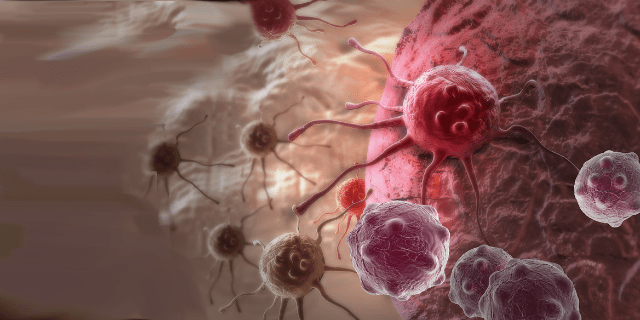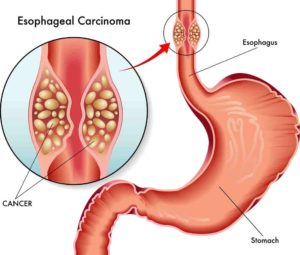
Diagnosed with Cancer? Your two greatest challenges are understanding cancer and understanding possible side effects from chemo and radiation. Knowledge is Power!
Learn about conventional, complementary, and integrative therapies.
Dealing with treatment side effects? Learn about evidence-based therapies to alleviate your symptoms.
Click the orange button to the right to learn more.
- You are here:
- Home »
- Blog »
- side effects ID and prevention »
- Neoadjuvant Chemo for Esophageal Cancer- Is it worth it?
Neoadjuvant Chemo for Esophageal Cancer- Is it worth it?

Esophageal cancer is complicated. Get help understanding both conventional and non-conventional therapies to increase both your quality and quantity of life
Neoadjuvant chemoradiation (undergoing chemo and/or radiation BEFORE you undergo surgery for your EC) is a good news/bad news scenario.
The good news is that chemoradiation before surgery makes the tumor smaller (downregulates your stage). The bad news is that chemoradiation before surgery doesn’t increase average overall survival aka help you live longer. Studies do not show an increased overall survival benefit.
The meta-analysis at the bottom of the page gives both the most recent information (2009) as well as a breakdown of specifics such as postoperative mortality and complications and local-regional and distant cancer recurrence.
EC in an advanced stage has poor 3, 4 and 5-year survival rates whether you have chemoradiation before, after, or not at all with surgery.
The answer in my experience is integrative therapy. Nutritional supplementation that research, as shown, both ENHANCES the efficacy of chemo and/or radiation while it REDUCES the collateral damage aka side effects.
For more information about the nutritional supplementation and lifestyle to enhance the efficacy of chemoradiation as well as reduce the toxicity of chemoradiation please scroll down the page, post a question or comment and I will reply to you ASAP.
Thank you,
David Emerson
- Cancer Survivor
- Cancer Coach
- Director of PeopleBeatingCancer
Recommended Reading:
- I have Barrett’s Esophagus- what are my options?
- Barrett’s Esophagus- Diagnosis, Prognosis and Treatment
- Ask the Cancer Coach-“Stage 4 esophageal cancer diagnosis and treatment”
Long-term Outcomes Following Neoadjuvant Chemoradiotherapy for Esophageal Cancer
Objective: We present and analyze long-term outcomes following multimodal therapy for esophageal cancer, in particular, the relative impact of histomorphologic tumor regression and nodal status.
Results: Thirty patients (12%) did not undergo surgery due to disease progression or deteriorated performance status. Forty-one patients (19%) had a complete pathologic response (pCR), and there were 31(15%) stage I, 69 (32%) stage II, and 72 (34%) stage III cases. The overall median survival was 18 months, and the 5-year survival was 27%. The 5-year survival of patients achieving a pCR was 50% compared with 37% in non-pCR patients who were node-negative (P = 0.86). Histomorphologic tumor regression was not associated with pre-CRT cTN stage but was significantly (P < 0.05) associated with ypN stage. By multivariate analysis, ypN status (P = 0.002) was more predictive of overall survival than TRG (P = 0.06) or ypT stage (P = 0.39).
“Conclusion: Achieving a node-negative status is the major determinant of outcome following neoadjuvant chemoradiotherapy. Histomorphologic tumor regression is less predictive of outcome than pathologic nodal status (ypN), and the need to include a primary site regression score in a new staging classification is unclear.”
Neoadjuvant chemoradiotherapy for esophageal cancer: is it worthwhile?
Background: With promising results from several institutions, many centers began treating patients with esophageal cancer with neoadjuvant chemoradiotherapy (NC) followed by esophagectomy. This approach is demanding for the patient and has not been proved to be better than esophagectomy alone.
Results: The median survival time of all patients was 16.3 months; 1-, 2-, and 3-year overall survival rates were 67%, 46%, and 39%, respectively. The median hospital stay was 12 days. The median postoperative treatment time was 3.3 months, which was 20% of the median survival time. Of the 51 patients, 19 were alive with a median follow-up time of 2.5 years. Twenty-nine percent of the patients had a complete pathological response with median and 1-, 2-, and 3-year survival rates of 17.5 months, 73%, 57%, and 57%, respectively. Palliation of dysphagia was excellent, with 44 (93%) of 47 operative survivors taking either a soft diet (18 [38%]) or a regular (26 [55%]) diet by the first postoperative visit…
“CONCLUSIONS: Median survival time with NC followed by esophagectomy for resectable cancer of the esophagus does not appear to be significantly better than that reported for esophagectomy alone. Further, treatment time with NC consumed 20% of survival time. Examining only these outcome variables suggests that NC is not worth-while.”
Neoadjuvant chemoradiotherapy for resectable esophageal carcinoma: a meta-analysis.
- “Postoperative mortality increased in patients treated with neoadjuvant chemoradiotherapy
- Incidence of postoperative complications was similar in two groups
- Neoadjuvant chemoradiotherapy lowered the local-regional cancer recurrence
- Incidence of distant cancer recurrence was similar
- Histological subgroup analysis indicated that esophageal squamous cell carcinoma did not benefit from neoadjuvant chemoradiotherapy”
Conclusion: Neoadjuvant chemoradiotherapy can raise the survival rate of patients with esophageal adenocarcinoma.”
Additional EC articles that may be of interest are:
Life after Esophageal Cancer Surgery aka Esophagectomy
“With most diagnoses of cancer, an early diagnosis means minimal therapy and a late-stage diagnosis means aggressive therapy. In the case of late-stage Esophageal Cancer, “the only established curative treatment includes extensive surgery, often of the abdomen, chest, and throat.” An esophagectomy often means an impaired quality of life….”
A Long-term Cancer Survivor’s Diet-
“I am going on record as a long-term cancer survivor. I’m interested in only one thing. Staying in complete remission from my “incurable” cancer. According to a growing number of studies, diet and nutrition are critical to my achieving long-term remission. I stumbled on the U.S. News ratings of the “best” diets and I thought I should make an evidence-based case for what I eat, and why I eat it…”


